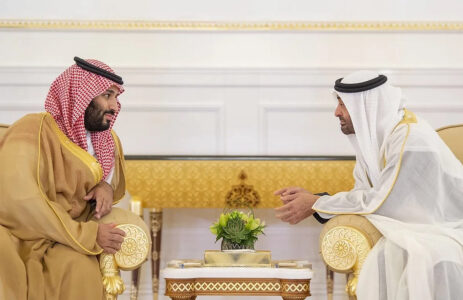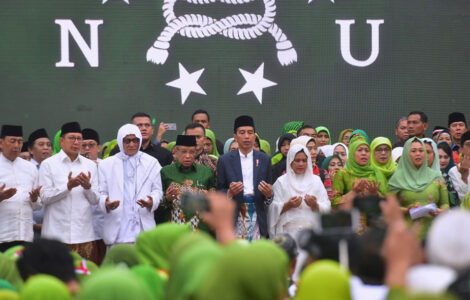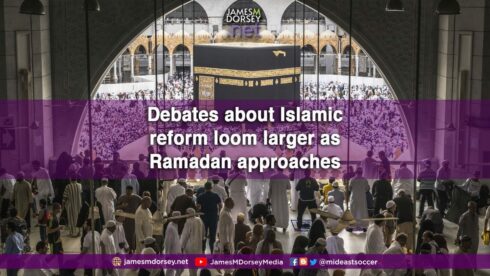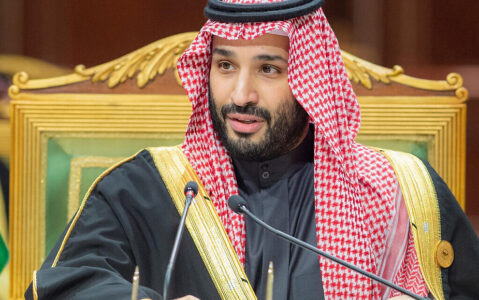Written by James M. Dorsey
Reform of Islamic jurisprudence was the elephant in the room when two prominent Saudi clerics recently clashed publicly on whether apostasy was punishable with death under Islamic law.
The debate’s timing on a Saudi state-controlled, artsy entertainment channel, Rotana Khalijiya, suggested as much.
The debate aired days before the kingdom’s Ministry of Islamic Affairs severely restricted celebrating Ramadan. Islam’s holy month of fasting begins on March 22.
What lends debates like the discussion about apostasy greater significance is that they feed into a competition between Saudi Arabia and various other players for religious soft power in the Muslim world.
The rivalry pits Indonesian reformists against state-aligned Saudi and Emirati propagators of a socially liberal but autocratic interpretation of Islam.
Saudi and Emirati-backed Islamic scholars reject jurisprudential reform and reserve the right of legal interpretation for the ruler and his clerical surrogates.
Last year, Saudi Crown Prince Mohammed Bin Salman went as far as nominating himself as the primary interpreter of Islamic law.
Mr. Bin Salman asserted in an interview with The Atlantic that “in Islamic law, the head of the Islamic establishment is wali al-amr, the ruler.”
Mr. Bin Salman meant that literally. The crown prince, in contrast to many Muslim rulers, seldom, if at all, solicits the opinion of Muslim scholars to legitimise his policies.
“Bin Salman puts religion at the service of his politics while protesting against the use of religion by his opponents,” said scholar and author of a book on the Muslim World League Louis Blin. The League is Mr. Bin Salman’s principal vehicle for propagating his autocratic version of a moderate form of Islam.
To be sure, Mr. Bin Salman and United Arab Emirates President Mohammed bin Zayed have enacted far-reaching social reforms that have enhanced women’s social rights and professional opportunities. Also, the two men have eased restrictions on gender interaction and embraced Western-style entertainment.
However, they anchored these changes in civil law and ignored the need to synchronise religious jurisprudence.
What drives the reformist zeal of Messrs. Bin Salman and Bin Zayed is not change because it is the right thing to do.

Crown Prince and Defense Minister of Saudi Arabia Mohammad Bin Salman (L) is welcomed by Crown Prince of Abu Dhabi Mohammed Bin Zayed with an official ceremony at Abu Dhabi Airport in Abu Dhabi, UAE on 22 November 2018 [BANDAR ALGALOUD/Anadolu Agency]
The two men’s primary concern is securing the survival of their autocratic regimes. To do so, they need to cater to youth aspirations, diversify their oil export-dependent economies, ease social restrictions to compete for foreign talent, and project an image of tolerance.
Their reforms serve that purpose but go no further.
Exhibit A is Saudi Arabia’s first-ever personal status law.
A recent Amnesty International analysis of the law suggests that it remains rooted in orthodox Islamic jurisprudence.
The law codifies problematic practices inherent in the kingdom’s male guardianship system.
It entrenches a system of gender-based discrimination in most aspects of family life, including marriage, divorce, child custody, and inheritance, even though it also sets a minimum age for marriage.
Under the law, women are required to obtain the consent of their male legal guardian to get married.
The law further obliges a wife to “obey” her husband. It conditions her right to financial support, such as food and accommodation, on her “submit(ting) herself” to her husband.
Moreover, men can initiate divorce without conditions, while women face legal, financial, and practical barriers. In divorce, a mother does not have equal rights to her children; the father is granted guardianship as a matter of principle.
Finally, the law institutionalises discrimination between men and women in inheritance, giving men a much larger share of assets than their female counterparts.
Similarly, recently announced restrictions on the public celebration of Ramadan were designed to shift the core of Saudi identity from religion to nationalism. They also intended to strengthen government surveillance and control.
With the restrictions, Mr. Bin Salman apparently wanted to be seen as walking in the footsteps of Mustafa Kemal Ataturk, the 20th-century visionary who carved secular Turkey out of the ruins of the Ottoman Empire and abolished the caliphate.
The new rules curtail the time allotted to evening prayers, forbid worshipers to bring their children to the mosque, ban the filming and broadcasting of prayers, curb donations for organising the breaking of the fast by worshippers, and oblige mosque officials to supervise the fast-breaking in courtyards rather than inside the mosque.
The measures resemble restrictions the government tried to impose last year. However, online uproar forced the government to retract a ban on broadcasting uninterrupted live Ramadan footage from the two mosques viewed by Muslims worldwide.
Looking for a silver lining in the restrictions, Indian Muslim thinker and Secretary-General of the Islamic Forum for the Promotion of Moderate Thought A. Faizur Rahman, said in a telephone interview that Mr. Bin Salman likely sees the reported measures as a way to counter the ritualisation of Islam.
That also is the message in the crown prince’s plan to build a futuristic downtown Riyadh with the Mukaab, a 400-metre-high square virtual reality cube, at its centre.
Critics have denounced the plan because the envisioned cube resembles the Kaaba, a black cuboid-shaped stone structure at the center of Mecca’s grand mosque.
Mr. Rahman described the Ramadan restrictions as “a bad imitation of Ataturk. It’s an expression of power. It’s saying I am the ruler.”
Some analysts believe that Mr. Bin Salman, like Mr. Ataturk in the past, wants to remove religion from the public square and relegate it to the private sphere.
In contrast to the waning years of empire and Turkey’s early republican period, Mr. Bin Salman has opted for achieving his goal by decree with no semblance of public debate.
To be sure, Mr. Ataturk’s reforms, including introducing French-style militant secularism, were unpopular and enacted by a one-party state.
Nevertheless, they followed a fierce battle of ideas in rival publications in the last 15 years of the empire about the role and the nature of Islam that was fresh in people’s minds.
Clerics, nationalists, and intellectuals voiced opinions ranging from the advocacy of European positivism and materialism, secular nationalism, calls for religious reform, and even rebukes of Islam and the Qur’an to fierce opposition to any reformation of religious discourse and rejection of the notion of a nation as opposed to a pan-Islamic state.
Citing Sura 16 Verse 125 of the Qur’an, Mr. Rahman, the Indian Muslim intellectual, argued that Mr. Bin Salman’s approach, that brooks no dissent and in which debate is often choreographed, was “not the way to reform society. Reform has to be voluntary through the art of persuasion. It’s neither Islamic nor good to impose your will.”
Where Mr. Bin Salman opts for a top down-dictate that focuses on form rather than content, his foremost ideological rival focuses on a bottom-up approach that embraces jurisprudential reform in pursuit of a moderate Islam that is pluralistic, inclusive, and unambiguously endorses the Universal Declaration of Human Rights.
Last month, Indonesia’s Nahdlatul Ulama, the world’s largest and most moderate civil society movement, called in a document composed in the tradition of Islamic jurisprudence to abolish the caliphate and replace it with the notion of the nation-state.

President Jokowi and First Lady Ibu Iriana attend the 73rd Anniversary of Muslimat Nahdlatul Ulama (NU), at Gelora Bung Karno Stadium, Central Jakarta, Sunday (27/1). Photo: Rahmat/ PR Division
The document was issued after consultations in the second half of 2022 in some 230 religious seminaries across the Indonesian archipelago in which the proposition of jurisprudential reform was debated.
In 2019, 20,000 Nahdlatul Ulama religious scholars issued a fatwa or religious opinion that erased the concept of the kafir or infidel in Islamic jurisprudence and replaced it with the notion of a citizen.
While apostasy, like blasphemy, is on the bucket list of Nahdlatul Ulama’s jurisprudential reforms, it was unusual for Saudi clerics to clash on television over interpretations of Islamic law.
The debate pitted Saudi Islamic scholar Abd Al-Rahman Abd Al-Karim, a proponent of the classical Islamic legal proposition of the death penalty for apostasy, against Ahmad al Ghamdi, the former head of the Mecca chapter of the Authority for Promotion of Virtue and Prevention of Vice.
In 2016, Mr. Bin Salman clipped the wings of the Authority, a once-feared religious police force, by banning it from “pursuing, questioning, asking for identification, arresting and detaining anyone suspected of a crime.”
Since leaving the Authority, Mr. Al-Ghamdi has emerged as a religious liberal advocating the very things on which his police unit once cracked down. These include mixing genders, listening to music, and the forced closure of shops and businesses during prayer time.
In the debate with Mr. Al-Karim, Mr. Al-Ghamdi appeared to adopt Mr. Rahman and Nahdlatul Ulama’s approach of bottom-up reform based on persuasion.
Countering Mr. Al-Karim, Mr.Al-Ghamdi asserted, “People who do not adhere to the Islamic faith are free to do so. They must not be coerced. The same is true for people who converted to Islam and then became apostates. There are unambiguous verses in the Quran regarding their freedom to do so. Allah said (in the Quran), ‘there is no coercion in religion.’”
Dr. James M. Dorsey is an award-winning journalist and scholar, a Senior Fellow at the National University of Singapore’s Middle East Institute and Adjunct Senior Fellow at Nanyang Technological University’s S. Rajaratnam School of International Studies, and the author of the syndicated column and blog, The Turbulent World of Middle East Soccer.









Now the arrogance to split Islam into 3 rivals change must be gradual and accepted.
MABUS = Mohammed Bin Salman
James M. Dorsey = FITNA doing its job.
Add Southfront
Reform, or reprogramming? The author uses MEMRI, a Zionist website, as a serious source. Remember, the Zios think they have more rights than everybody else. See mizvot/noahide laws. The “Human Rights” are the leftovers of our God-given rights, they are in fact a debasement. This was very well understood by the Muslim Brotherhood. The Saudi “modernizers” will go to hell, and the Arab world with it if they are to be followed.
Yes, and centcom used iswap to take over Boko Harams Sovereign Territory.
And meanwhile asshead bin mossad al sufyani wants to normalize with sodomites like sfgay and chrisgayr al assincelepfeces and ason the gay zoroastrian (on speed).
Boko Haram was OG Muslim Brotherhood and was known to be completely Pacifist, until jewish settler sodo-edomites from gayreece took over the wigger popo in Nigeria.
Boko Haram are Wahhabis.
Yes, unlike jewhabis such as greek army, basij, centcom and kikesis.
If these 4 have any relation to each other…
1400.Muharram.01 Ikhwan 313
“The Grand Mosque was desecrated (by binned salmons sagay and france).”
Sheik Osama Bin Laden Al-Yamani
Sheik Osama Bin Laden Al-Josephs own brothers threw him down the well, and his very own Mother cut ties with him (at the recommendation of m-BS, m-i666, mossad, basij, kgb, and centcom, aka the keypers of al-kabaal)
#TheReformationOfSodomiteDesecration
sfgay is desecrated by faggots
JHK is desecrated by insanity
I find your constant reference to sinfulness appalling. Daily cleansing post haste!
harleydavidsons are for faggot jews, the most sinful army, you dyke.
I would like to bang dykes on Harley Davidson